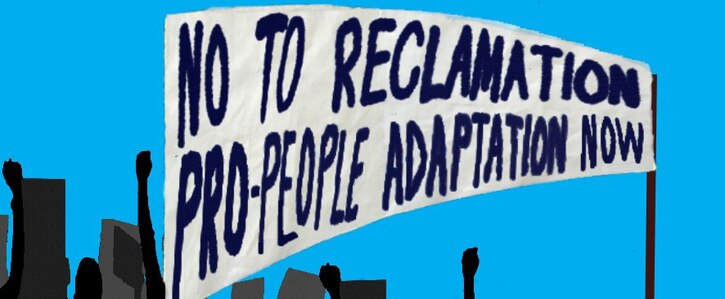100 signatures reached
To: Department of Environment and Natural Resources (DENR), Bureau of Fisheries and Aquatic Resources (BFAR)
Filipino Youth Say No to Reclamation! Pro-people Adaptation now!

Join the Filipino youth in saying no to reclamation with these demands to these government agencies. Amid the climate crisis that increases Filipinos’ vulnerabilities, we need adaptation that is genuine and puts people over profit!
1. Genuine and active role of youth in the process of application and decision-making processes.
The Department of Environment and Natural Resources must allow and respect the right of the public to access the Environmental Impact Assessment Studies and any Environmental Compliance Certificate issued for reclamation projects. We demand that the voices of young people be heard and taken into account in all decision-making processes related to coastal reclamation projects. Our generation will be the most affected by the long-term impacts of these projects, and we have the right to participate in shaping our future.
2. Drop existing reclamation and dredging projects.
The Bureau of Fisheries and Aquatic Resources must issue letters of objections to all dump-and-fill projects as well as dredging in all coastlines. We demand that all ongoing and planned coastal reclamation projects in the Philippines be immediately halted. These projects pose a significant threat to our marine ecosystems and the livelihoods of our fisherfolk. We urge our government to prioritize the protection of our environment and the interests of our people over the profits of corporations.
3. Reallocate funds towards prioritising pro-people adaptation, investing in sustainable and youth-led solutions.
We call on the National Government to prioritize investment in sustainable and youth-led solutions to protect our oceans and coastlines. This includes supporting innovative solutions developed by young people, such as the use of renewable energy sources, sustainable fishing practices, and the implementation of green infrastructure. Reallocation of funding of the military and NTF-ELCAC must go to efforts that put communities and the environment first.
1. Genuine and active role of youth in the process of application and decision-making processes.
The Department of Environment and Natural Resources must allow and respect the right of the public to access the Environmental Impact Assessment Studies and any Environmental Compliance Certificate issued for reclamation projects. We demand that the voices of young people be heard and taken into account in all decision-making processes related to coastal reclamation projects. Our generation will be the most affected by the long-term impacts of these projects, and we have the right to participate in shaping our future.
2. Drop existing reclamation and dredging projects.
The Bureau of Fisheries and Aquatic Resources must issue letters of objections to all dump-and-fill projects as well as dredging in all coastlines. We demand that all ongoing and planned coastal reclamation projects in the Philippines be immediately halted. These projects pose a significant threat to our marine ecosystems and the livelihoods of our fisherfolk. We urge our government to prioritize the protection of our environment and the interests of our people over the profits of corporations.
3. Reallocate funds towards prioritising pro-people adaptation, investing in sustainable and youth-led solutions.
We call on the National Government to prioritize investment in sustainable and youth-led solutions to protect our oceans and coastlines. This includes supporting innovative solutions developed by young people, such as the use of renewable energy sources, sustainable fishing practices, and the implementation of green infrastructure. Reallocation of funding of the military and NTF-ELCAC must go to efforts that put communities and the environment first.
Why is this important?
The Philippines has one of the longest coastlines in the world, with a total length of approximately 36,289 kilometers. These coastlines are threatened by dredging, dump-and-fill projects, and other activities related to reclamation. The Philippines currently has over 180 proposed and ongoing reclamation projects. Coastal reclamation in the country has negatively impacted our marine ecosystems and the livelihoods of fishing communities. Reclamation activities can destroy coral reefs, our mangroves, seagrass beds, wetlands and other marine habitats which disrupt fish migration patterns, and decrease fish stocks, leading to a decline in the income of fisherfolk.
The current form of reclamation projects also pose an increased risk of flooding and erosion, especially in areas that are prone to natural disasters such as typhoons and storm surges.The sites of these projects are vulnerable to ground shaking and liquefaction that raise red flags to people’s safety when earthquakes and flooding occur.
The youth of the Philippines will be the most affected by the long-term impacts of these projects, which is why it is essential that our voices are heard in decision-making processes. We enjoin you to strengthen our efforts to defend and protect our country's natural resources.
Stop dump-and-fill and dredging projects that threaten life both in land and sea!
Break the silence, sign on, and let our voices be heard.
Stop reclamation!
#NoToReclamation
#ClimateJusticeNow
The current form of reclamation projects also pose an increased risk of flooding and erosion, especially in areas that are prone to natural disasters such as typhoons and storm surges.The sites of these projects are vulnerable to ground shaking and liquefaction that raise red flags to people’s safety when earthquakes and flooding occur.
The youth of the Philippines will be the most affected by the long-term impacts of these projects, which is why it is essential that our voices are heard in decision-making processes. We enjoin you to strengthen our efforts to defend and protect our country's natural resources.
Stop dump-and-fill and dredging projects that threaten life both in land and sea!
Break the silence, sign on, and let our voices be heard.
Stop reclamation!
#NoToReclamation
#ClimateJusticeNow

